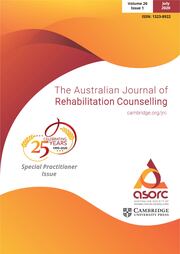No CrossRef data available.
Article contents
Assessment of Everyday Memory in Rehabilitation Settings: A Review of the Rivermead Behavioural Memory Test
Published online by Cambridge University Press: 27 August 2015
Abstract
The Rivermead Behavioural Memory Test (RBMT) is reviewed and its utility in rehabilitation settings is explored. The RBMT purports to be “ecologically valid” — a test of everyday memory. It is concluded that the RBMT is quick and easy to administer, is available to a range of health professionals, and has high face validity as a measure of everyday memory performance. However, the normative sample obtained was relatively small, limited age-norms were provided, it did not assess incremental learning and there was a tendency to obtain a ceiling effect in non-clinical groups. Additional normative data have been reported by others. The RBMT is most likely to be useful in acute rehabilitation or with more impaired clinical groups and is recommended as a useful tool for the assessment of memory impairment.
- Type
- Articles
- Information
- Copyright
- Copyright © Cambridge University Press 1997


